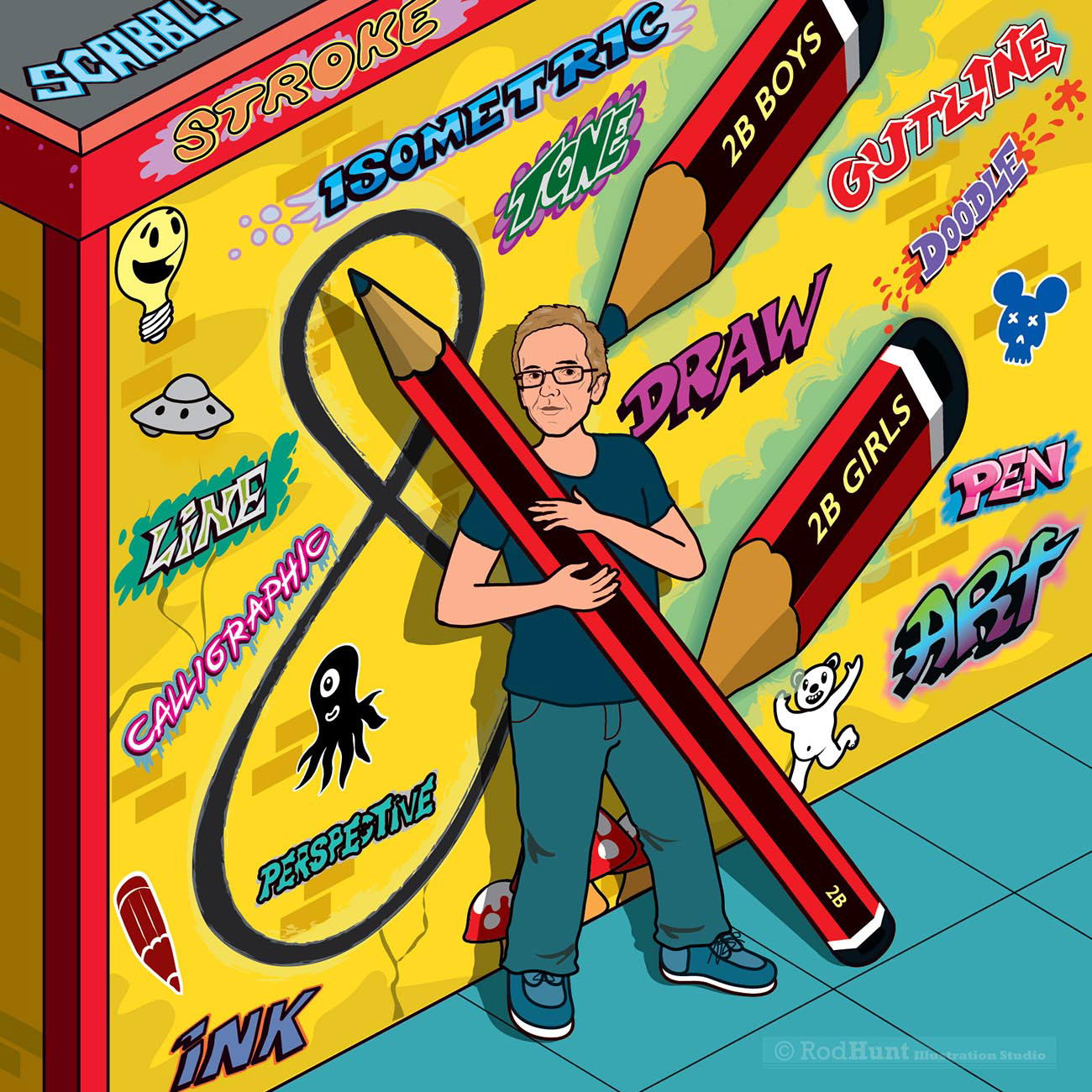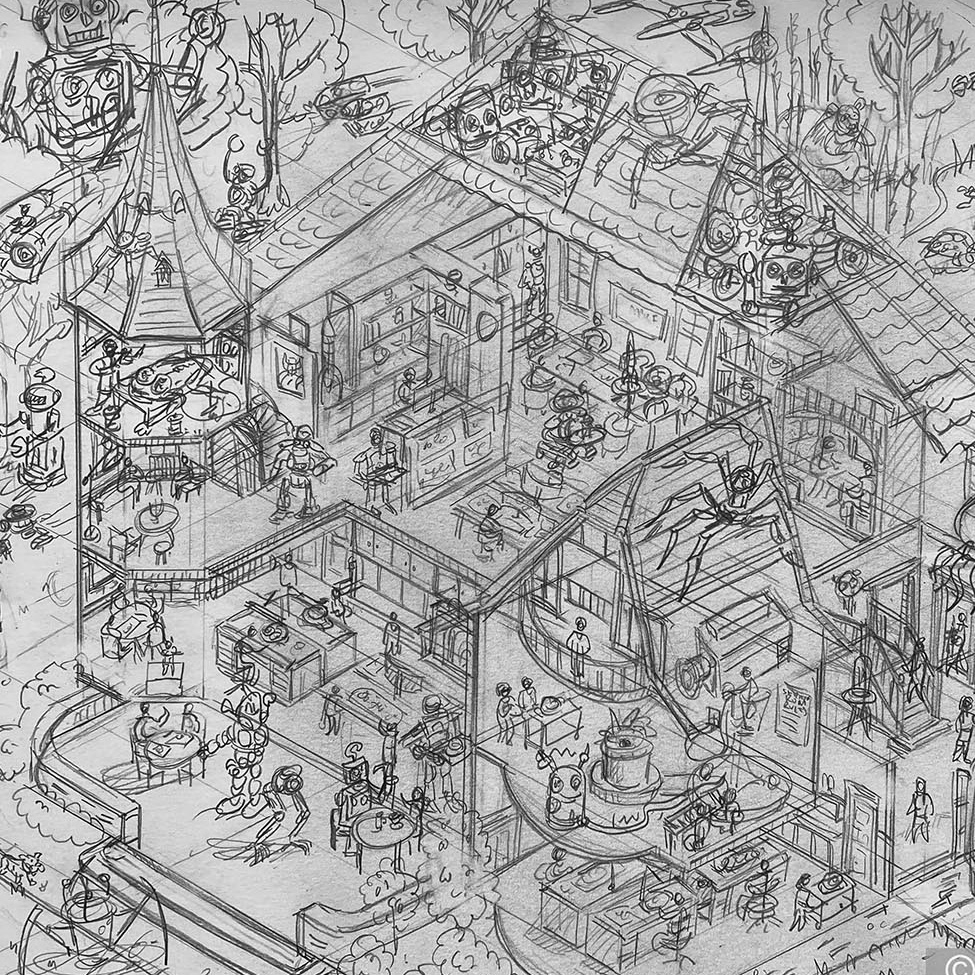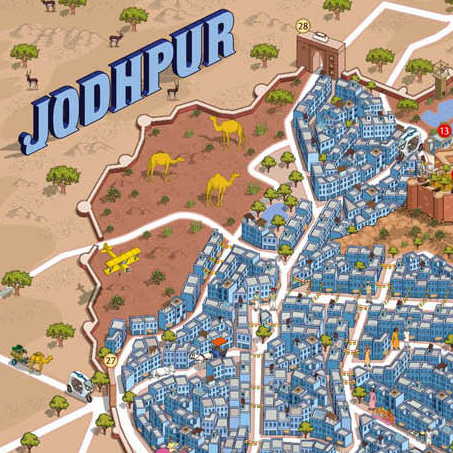Rod Hunt is an award winning London based illustrator and map artist specialising in detailed character filled illustrations and isometric maps. With his extensive industry knowledge Rod has been a regular public speaker Internationally for conferences, events, organisations and art colleges including Children's Books Ireland, Offset (Dublin, Ireland), Pixel Show (Sao Paulo, Brazil), Campus Party (Sao Paulo, Brazil), The Illustration Conference, University of the Arts and The Association of Illustrators. He has spoken on subjects including Self Promotion for Illustrators, the Business of Illustration and his own 30 year career journey.
Illustrator Rod Hunt speaking at Offset Design Festival, Dublin
In your view, what’s the secret to giving a standout talk? What are the golden rules for presenting your work on stage?
Inspire, inform, and educate, and on a practice level prepare, practise and time your talk. As my dad used to say “Prior preparation prevents piss poor performance’.
Is there anything you should avoid doing? (Any typical bad habits that are easy to pick up? Or cultural faux pas to consider, for example?)
It’s important to remember to face towards the audience, speak up and project yourself. Try not to rush and take natural pauses in your speaking. I would always avoid reading off a sheet, the delivery becomes very stilted and lacks a natural flow. I think it’s better to remember roughly what you’re going to say then improvise a bit while on stage to keep some spontaneity. Try not to cram too many slides in your presentation and show a hundred projects, the danger is you’ll have to rush though them to get though things at the end if time is getting short. It's probably better to concentrate on a 4-6 great projects with more depth about their creation.
There are many different ways to format and deliver a talk - some speakers design slides outlining the parameters of what they want to talk about and then speak off the cuff; others memorise the whole thing; others read it out word-for-word… What’s your personal method of choice - and why does it work for you?
My preferred method is to roughly memorise what I’m going to say and use the visual presentation as cues so I know what I was intending to say at the right time. Before the talk I’ll practice in private a few times speaking out loud with the visuals so I know what I’m going to say with which slide and time the talk so I know I won’t overrun. This gives you the chance to edit things down if necessary.
When presenting if it’s possible I prefer to use a radio mic and progress the visuals with a remote so I can walk the stage rather than be static behind a lectern. I find using lectern a barrier between myself and the audience which can mean you can hide behind it and use it as a crutch if you’re not careful.
Delivery can depending on the what I’m talking about; lectures on specific subjects like self promotion, business, copyright or protecting your work online might be more information heavy so will probably have more text for key points in the visual presentation, thought only as bullet points rather than long passages of text. Talks that are more about my work and career might be looser in a format with images and minimal text.
In your experience, what kinds of things can typically go wrong when you’re talking at a conference or event (or even in a pitch situation)? Do you have any tips or tricks for preventing these things happening?
You may have ‘mind freeze’, a ‘What the hell was I going to say next?’ moment, which is where the presentation on screen gives visual cues which relate to what you were going to say at that point. Technical issues do occasionally happen such as videos not playing or a slideshow misbehaving. Ideally it’s best to submit the presentation to the organisers in good time before the talk and check it through on their equipment to make sure it works as expected. If there are glitches while presenting try not let it throw you. Make a joke of it, and if it can’t be solved quickly move on to the next thing in your presentation. It's better not to have 'dead air.'
Illustrator Rod Hunt speaking at Pixel Show Design Festival, Sao Paulo
What’s the worst thing that’s ever happened to you while presenting your work to an audience? What happened, and how did you deal with the situation?
I almost backed out after finishing and getting off stage at ICON6 The Illustration Conference in Pasadena. It was the biggest audience I had done at that point to around 600 people. The talk had gone very well and I walked off stage. The conference director Mark Heflin came over to congratulate me and as we were speaking I suddenly felt my vision going dark and drawing in like a black tunnel. I had to sit down very quickly and compose myself for 20 minutes or so before I felt right again. I think it was a combination of the adrenaline, not eating lunch, relief and jet lag.
Pure fear is one of the biggest reasons designers turn down invitations to speak… Do you have any pro tips for overcoming nerves? Are there any psychological or practical tips and tricks you can share?
In the the movie The Matrix spoonboy says 'Do not try and bend the spoon, that's impossible. Instead, only try to realize the truth...there is no spoon. Then you will see it is not the spoon that bends, it is only yourself.'
So sometimes before I go before an audience I’ll think to myself 'There is no spoon' to remind me that any nerves are only in my head. Once you’re up on stage I find that any nervousness usually falls way and you concentrate on delivering what you have to say. Plus you can't always see the size of the audience with the stage lights on you. I try to ensure to have a calm moment before I give a talk, arriving in plenty of time so I don't have to rush or not have time to deal with any unforeseen eventualities.
What advice would you give to designers and other creatives who are gearing up to present their work on stage for the first time?
If should be fun, most of us like to talk about the work we create so try to relax, not worry and enjoy the experience. You’ve been invited to speak so people must want to hear what you have to say.
Increasingly at design conferences and creative events, a speaker standing on stage and just walking through their portfolio rarely seems to cut it… Many of the best talks give audiences a take-away, or ‘something extra’, from speakers on stage. How would you define that ‘something extra’ to someone who’s about to present their work/career on stage for the first time - what does it mean? What’s the point of it - why is it such a good speaking device?
I think it’s important to give a story with depth that is more than a ‘show and tell’ of lots of work. It's good to have a story, maybe include your working process, failures as well as successes and practical information about being a professional designer or illustrator. People want to learn about how you archived it not only see the final results and many cool pieces of work. I think it’s good for people to know that you had your share of failure and struggles on the journey, you didn’t arrived fully formed and successful. That makes you more human, approachable and relatable to the audience.
Maybe pick an aspect of your work like a niche you have created. For instance I do a lots of illustrated maps. How did this come about, why create a niche for myself? Have a reason to show a project rather has just 'I think this is cool to show.'
Lastly, in what ways have the public speaking skills you’ve developed helped you off stage? For example in a pitch, networking situation or speaking to clients?
Public speaking has probably helped with building my confidence for various presentation situations. I’ve done 4 or 5 pitches to various TV production companies for show ideas over the years and public speaking has probably helped with preparation, helping control my nerves while making the pitch.
View Illustration Portfolios: Illustration - Map Illustration - Search and Find Illustration - Where's Waldo / Wally Style Illustration - Book Illustration
Infographic Illustration - Animation - Isometric Illustration - Isometric Art - Cutaway and Cross Section Illustration - Advertising Illustration
Murals and Site-specific - Wimmelbilderbuch Car and Automotive Illustration - City Illustration - 3D Map Illustration




